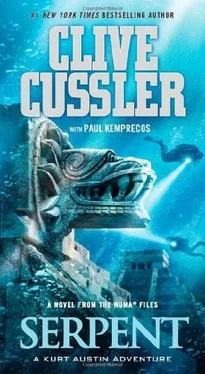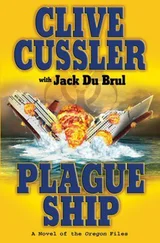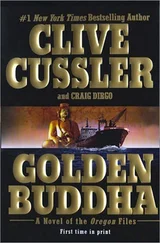Perlmutter crystallized his findings, stopping only to nibble now and then at a roll.
A fifth voyage of discovery," Austin mused. "That would certainly shake up the historians and call for an update of the history books. What's your professional opinion? Was the letter a fraud?"
Perlmutter cocked his head in thought, laying a forefinger along his fleshy cheek. "I read it several times, and I still can't give you a definitive answer, Kurt. If it is a forgery, it is a damned clever one. I compared it to other, authenticated Columbus documents and Las Casas writings. The style, the syntax, the penmanship are consistent:"
And as you pointed out, why would. anybody go through the trouble to steal a phony document?"
"Why indeed?"
The waiter brought the wine to their table. Perlmutter held the glass to the light, swished its contents around, inhaled the bouquet, and finally took a sip. He closed his eyes. "Superb, as I knew it would be," he said with a beatific smile. "Truly a legendary year."
Austin tried the wine. "I'll have to agree with you, Julien." He put the glass aside and said, "You mentioned a reference in the letter about Columbus being contrite over the 'death of the five.' What do you make of that?"
The blue eyes danced with excitement. "I'm surprised you didn't catch that right away. I dug through my library and came across a strange story from.a source named Garcilaso de la Vega. It may shed light. He claimed that seven years before Columbus set sail on his historic first voyage, a Spanish ship was caught in a storm off the Canaries and came ashore on a Caribbean island. Of the seventeen-man crew, five survived. They repaired the ship and returned to Spain. Columbus heard of their adventure and invited them to his house, where they were entertained lavishly. As the festivities wore on they naturally poured out the details of their travails."
"Not surprising. Sailors like to swap sea stories even without a few glasses of vino to loosen their tongues."
Perlmutter leaned his great bulk forward. "It was much more than a friendly gam. This was undoubtedly a well-planned intelligence-gathering operation. Those simple sailors had no idea they possessed knowledge of incalculable value. Columbus was trying to organize an expedition and find the funding for it. Here were eyewitness accounts and navigational information that could open the door to vast riches. The crew could provide him with details of current, wind direction, compass readings, latitude, the number of days they sailed. Maybe they had seen the natives wearing gold ornaments. Think of what that meant. Their experience not only proved one could sail to China or India, which is what Columbus thought he'd be doing. It showed how to get there and back! Columbus intended to claim new lands for Spain. He was convinced he'd find gold and at the very least meet the Great Khan and open up a lucrative monopoly trade for spices and other valuable goods. He was well aware of Marco Polo's fame and fortune and figured he could do much better."
"No different from the industrial espionage that goes on today," Austin commented. "Instead of bribes, listening devices, and prostitutes to gather information on corporate . rivals, Columbus pumped his sources with food and drink."
"He may have pumped them with more than food and drink."
Austin raised an eyebrow.
All five men died after dinner," Perlmutter said.
"Overindulgence?"
"I've been at a few meals that nearly killed me, but de la Vega had his own ideas. He implied that the men had been poisoned. He couldn't come right out and say so. Columbus had powerful connections. Consider this, however. It is a historical fact that Columbus had a map of the Indies on his first voyage." He took a sip of wine and paused for dramatic effect. "Is it possible his map was based on what he learned from those unfortunate sailors?"
"Possible. But from what the letter says, Columbus disavowed their deaths."
"Correct. He blamed it on this so-called brotherhood. Los Hermanos. "
"Didn't Columbus have a brother?"
"Yes, his name was Bartolome. But Columbus used the word in the plural. Brothers."
"Okay, suppose you're right. Let's give. Chris the benefit of the doubt. He invites these guys to his house to see what information he can get out of them. Los Hermanos take the extra precaution of seeing that they will tell nobody else what they've seen. Columbus may be a hustler but he's no killer. The incident haunts him..
"A plausible scenario."
"Do you have any idea what this brotherhood was, Julien?"
"Not a clue. I'll return to my books after lunch. Speaking of which . . . ah, the Thai fish soup." Perlmutter had spotted the first of many dishes making its way to their table.
"While you're doing that I'll ask Yaeger to see if he has anything on them in his computer files."
"Splendid," Perlmutter said. "Now I have a question. You have a practical rather than a historical knowledge of the sea, as I do. What are your thoughts on this talking stone Columbus mentioned, this torleta of the ancients that was described in the letter?"
"Early navigational techniques have always fascinated me," Austin said. "I consider their development to be a huge intellectual leap for mankind. Our ancestors had to bring abstract concepts such as time, space, and distance to bear on the problem of getting from one place to another. I love the idea of punching a button and having a signal bounced off a satellite tell me exactly where I'm standing anywhere on the globe. But I think we rely too much on electronic gadgets. They can break And we're less inclined to understand the natural order of things; the movement of the stars and sun, the vagaries of the sea."
"Well, then, let's put those electronic gadgets aside," Perlmutter said. "Stand in the shoes of Columbus. How would you go about using your torleta?"
Austin thought about the question for a moment. "Let's back up to his earlier voyage. I'm stranded on an island where I'm directed to some kind of stone or tablet with strange inscriptions. The locals tell me it's the key to a great treasure. I take it back to Spain, but nobody can figure out what it is. Only that it is very old. I look at it from a mariner's point of view. The markings are similar in some respects to the kind of plotting board I've used all my sailing life. It's too hefty to haul around, so I do the next best thing. I have charts made based on the inscriptions and set sail. Only problem is, I haven't got it quite right. There's a gap in my knowledge."
"What sort of gap, Kurt?"
Austin pondered the question. "It's hard to know without an idea of what the torleta actually looks like, but I'll describe a hypothetical situation. Suppose I'm a sailor from Columbus's time and somebody gives me a NOAA chart. The geographical depictions would help me get around, but the lines with the long-range navigation coordinates wouldn't make sense to me. I'd know nothing of electronic signals sent out by shore stations or receivers that could translate the signals into pinpoint. locations. Once I was on the water out of sight of land, I'd have to go back to traditional methods."
"A most lucid analysis. So what you're saying is that once Columbus was at sea, he found that the torleta of the ancients was only of limited assistance."
"That's my guess. Ortega's books say Columbus didn't have much faith in the navigational instruments of his day, or maybe he simply wasn't competent in their use. He was a dead reckoning sailor of the old school. It served him fine on his first voyage.
He knew he needed to be precise on this final trip, so he hired someone who could use navigational instruments."
"Interesting, in view of the last passage in the letter, which is written by the Nina's assistant pilot."
"There you go," Austin said. "It's no different from hiring a specialist to do a job today. Now it's my turn to bat a question back to you. What do you suppose happened to the stone?"
Читать дальше












